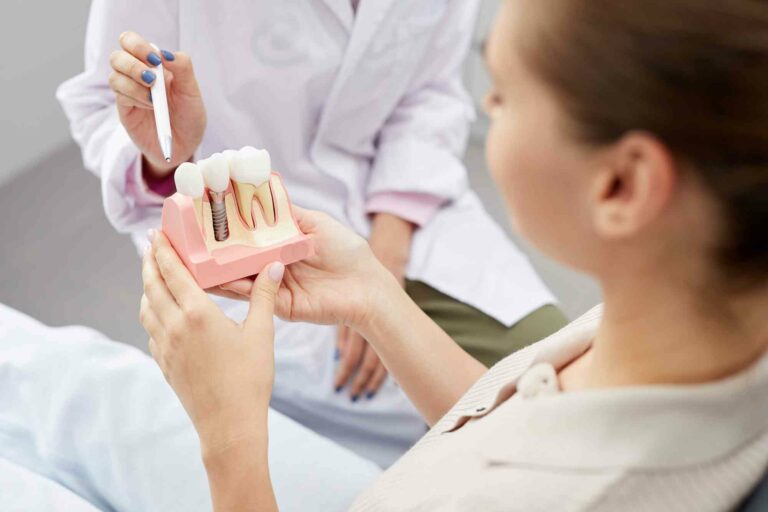Missing teeth can be a significant source of discomfort and self-consciousness. Fortunately, dental procedures like implants provide a long-term solution for individuals looking to enhance their smile and confidence.
Dental implants are an increasingly popular option to restore missing teeth. In fact, the sector is estimated to grow to USD$6.603 billion in 2025 from almost USD 4.5 billion in 2021. These solutions are ideal for individuals suffering from teeth loss due to periodontal disease, injury, or other reasons.
So, whether you’re considering getting dental implants or just curious about it, knowing what to expect before, during, and after the procedure is essential to ensure a successful outcome. Read on as this article discusses the things to expect when getting dental implants.
Also, if you are looking for a dental implant first find information about the Cost Of Dental Implants before treatment.
Before The Procedure
Schedule a consultation with your dentist. During this appointment, your dental professional will conduct a comprehensive mouth examination, which may involve taking X-rays and scans. This examination aims to determine whether you are a suitable candidate for full-mouth dental implants or other relevant procedures.

Your dentist will carefully assess your oral condition and discuss options with you. Expect the dentist to gather your medical history to ensure your overall health suits the upcoming surgery. However, if you have specific health conditions, such as diabetes or heart disease, your dentist may consult your physician to ensure you can safely undergo the procedure.
Once all these preliminary evaluations have been completed and if you decide to proceed with the dental implant procedure, your dentist will schedule a surgery appointment and provide detailed instructions for the next steps. During this time, you can also discuss with your dentist whether your artificial teeth will be fixed in place, removable, or a combination of both options.
Preparing for a Dental Implant
Preparing for a dental implant doesn’t have to be daunting. By understanding the process and what to expect, you can prepare for the procedure and ensure a successful outcome.
Make sure you have a thorough understanding of the process and what to expect. Talk to your dentist and ask questions to ensure you’re fully informed. You may also want to research the procedure online to learn more about it.
Maintaining a good oral hygiene routine is crucial. Prioritize the health of your mouth by consistently practicing thorough brushing and flossing. This will help keep your mouth clean and reduce the risk of infection. If you are a smoker, consider quitting before the procedure, as smoking can impede healing and heighten the chances of complications.
During The Procedure
The dental implant procedure involves several steps, including the following:
- Administration Of Local Anesthesia: To ensure your comfort, the dentist will administer local anesthesia, effectively numbing the area and minimizing pain.
- Removal Of Damaged Tooth: If necessary, the dentist will carefully remove any damaged tooth to prepare the area for the implant.
- Incision And Exposure: To place the implant in your jawbone, the dentist will make a small incision in your gum, exposing the underlying bone.
- Implant Placement: Using specialized instruments, the dentist will skillfully drill a hole into the bone and securely position the implant.
- Closure Of Gum: After the implant is in place, the dentist will meticulously suture the gum tissue, ensuring proper healing and protection of the implant site.
- Temporary Crown Placement: A temporary crown will be affixed to the implant, providing functionality and aesthetics during healing.
The duration of the procedure may vary depending on the number of implants required and other individual factors. If you have missing teeth and are considering dental implants, it is advisable to consult your dentist.
After the Procedure
After the surgery, you may experience the following symptoms:
- Discomfort
- Swelling and bruising of the face and gums
- Pain at the implant site
- Minor bleeding
To alleviate these symptoms, you can employ pain medication and ice packs. Additionally, it is recommended that you follow a soft food diet for a few days after the procedure while avoiding crunchy, hard, or sticky foods.
Treatment Completion
After the surgery, it is essential to prioritize the healing process. Unlike dentures or less invasive treatments like tooth bonding, dental implants require several months to integrate and heal with the jawbone fully. Only once the implant has healed can the restoration process proceed with your dentist’s permanent crown placement.
To expedite healing and ensure treatment completion, it’s crucial to maintain meticulous oral hygiene and prevent infection. Your dental professional will provide detailed instructions on caring for your implant and schedule follow-up appointments to monitor your progress.
Benefits of Dental Implants
Dental implants offer several benefits, including improved appearance, comfort, speech, and oral health.
- Enhanced appearance: Dental implants appear and feel like natural teeth, improving your smile and confidence.
- Enhanced comfort: They eliminate the discomfort and inconvenience of removable dentures.
- Improved speech: Dental implants eliminate the speech difficulties caused by missing teeth or ill-fitting dentures.
- Improved oral health: Oral implants can help prevent issues leading to other dental problems, including bone loss and gum recession.
While upfront costs may be high, getting dental implants offers a long-term solution that can last a lifetime. This means you can skip spending hefty fees for maintenance and replacement compared to other tooth and smile restoration solutions.
Conclusion
Getting dental implants can be a transformative experience, allowing you to eat, speak, and smile confidently. By understanding what to expect in the different stages of the procedure, you can prepare for the process and ensure a successful outcome. If you are considering dental implants, talk to your dentist to decide if they are right for you.
